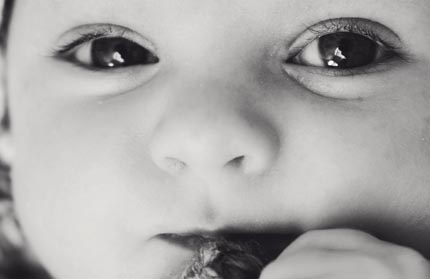Baby Blessings, Feminism, and Worldviews
Posted on Jan 14, 2013 by Trevor in Being Dad, Religion

I cross-posted this at RationalFaiths.com to try my hand at writing for a larger audience. To my delight, Mormon feminist superheroine Joanna Brooks stumbled across it and even gave it a tip of the hat.
Baby Blessings
The baby blessings we do in the LDS Church are a wonderful ritual, in my opinion. I’ve pondered what kinds of things I might say when blessing my own little one ever since I first thought about becoming a father. As I’ve become increasingly feminist over the years, I developed a desire to do everything possible to include my wife in the blessing. After all, she did all the work through pregnancy and labor, and the baby blessing is the most public presentation of the culmination of that work. Why should the man get the spotlight? Could my wife hold the baby during the blessing? Could she say some words of her own?
Being that both of us are somewhat reserved socially and not intent on rocking the boat, we felt uncomfortable with those options. What I decided on was that I would use inclusive phrases in the blessing such as, “Your mother and I…” whenever possible. I congratulated myself for being so thoughtful.
Days before the blessing, however, something dawned on me. I had overlooked another option so obvious that I’m embarrassed to admit it: I never even considered asking my wife what kinds of things she would like to hear in the blessing. Wow. My wife, of course, was quite content to provide me with her ideas. (Side note: maybe I should read more Mormon feminist blogs.)
Critiquing Religious Practice
Now, I’ve been accused at times of actively searching for problems with my church; you know, “making mountains out of molehills” or “seeing a bogeyman in every closet”. This charge is sometimes, although not very often, true. I do affirm that there are sexist elements* in our doctrine, our manuals, our rhetoric, and when I discuss this with others, I am usually told that these religious or cultural elements are divinely inspired, irrelevant, invented, or isolated.
To put it concisely, the realization that hit me so strongly is this: if a guy like me can’t even spot something I’m actively looking for—namely, inequalities and ways to minimize them—how in the world would these problems be acknowledged or understood by someone who refuses to even admit there is systemic inequality in the way we treat and speak about women?
The funny thing is that I’m not suggesting that seeking my wife’s input on the blessing is at all a controversial move. I don’t think even the most conservative Mormon I know would find it objectionable. However, I searched Church publications for guidelines on the blessing of children. Nowhere did I find a suggestion to consult with the mother to determine what blessings she might seek to have imparted on her own child. In fact, this possibility doesn’t appear in guidelines about any ordinances for which it might be highly advisable. I realize that a lot of men just improvise the blessing, saying whatever they feel prompted to say at the moment. But a lot of other men prepare, and in my opinion the occasion calls for it. And even if the father doesn’t gather any thoughts beforehand, shouldn’t the mother still be given the chance? In my opinion, the fact that something so obvious (and yet so simple and so wholesome!) is neither commonplace in practice nor in guidelines, constitutes powerful prima facie evidence of systematic inequality.
Our Worldviews Limit Us
Social scientists who speak on phenomena like structural racism or sexism emphasize just how difficult it is for people to step outside their own worldviews. We survive day to day by interpreting the data we accumulate in our lives and forming it into patterns. Anything that doesn’t fit our current pattern is in jeopardy of being miscategorized or even ignored, and this can happen without us even being the least bit aware of it. None of us is excluded from the confines of a worldview. Everyone has blind spots, even when we’re consciously aware of our vulnerabilities in that regard.
That’s why, even though it’s difficult, I think it’s so important to try to see the world through other people’s eyes and give them the benefit of the doubt when they are pointing out something that we simply cannot see. Yet unfortunately, whenever a critique of my religious community surfaces, by far the most common reaction is to shout it down rather than consider what merit it might have. Whether it’s politics or even religion, we would all do well to curb fanatic, unquestioning cheerleading and to always leave the door open to the possibility that someone else might have a decent idea that would improve our own corner of the world.
*I want to be sure to head off all notions that when I’m calling for equality I’m pretending men and women are exactly the same, or trying to erase all differences between the sexes, or saying women should act like men, or that men are disposable, etc. That’s just plain nonsense. The changes I’m calling for relate to roles, duties, and rhetoric that unnecessarily limit what women can or should do.

